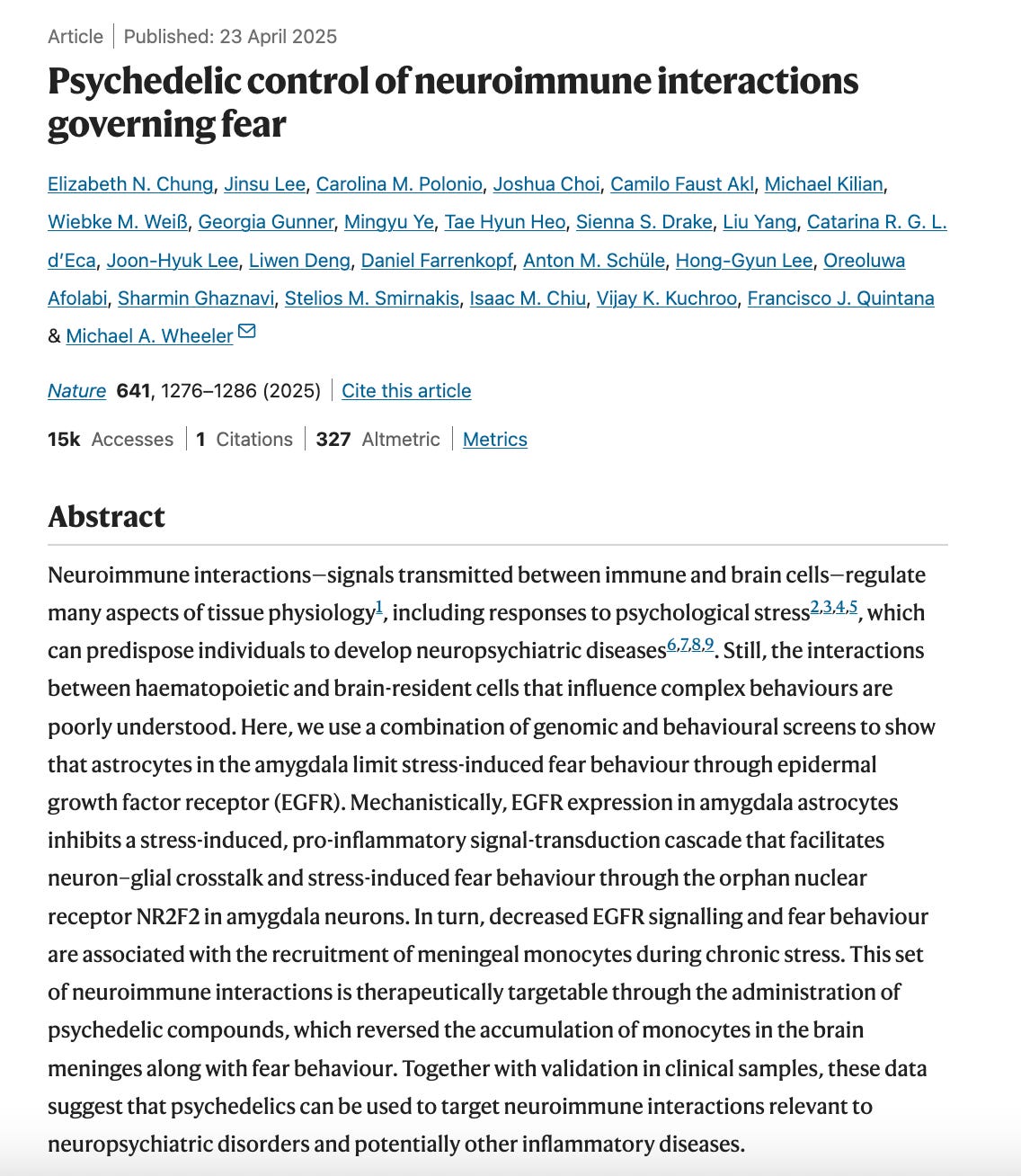Weekly M&M | May 29, 2025
Psychedelics & Immune System, Hidden Seed Oils in Diet Research, Psilocin Prodrugs, Choline Metabolism
Newest Episodes:
Last episode: “Psilocybin & MDMA: Inflammation, Stress & Brain-Body Communication” | Michael Wheeler PhD | [Listen here]
Current episode: “Psychedelic Chemistry, Magic Mushrooms, Kratom, Gray Market Research Chemicals, Vape Shops“ | Andrew Chadeayne, PhD | [Listen here]
Next episode: “Long-term Pharmaceutical Use, Adverse Drug Reactions & Chronic SSRI Exposure“ | David Healy, MD, PhD | [Listen here]
Upcoming Guests:
William Bement, PhD (Cell Biologist) - Cytoskeleton & Self-Organizing Dynamics in Cells
Other News:
I am working on a new article about genetic variation in genes important for fatty acid metabolism in humans. That should be ready soon. I discussed aspects of human metabolic evolution with Dr. Eske Willerslev in M&M 154, in our discussion about population genetics and the origins of modern Europeans. You can listen to that discussion now, and read more detail when the article goes up (probably by this weekend). In short, there are two main haplotypes of FADS genes in modern humans, which encode fatty acid desaturase enzymes that process polyunsaturated fatty acids (PUFAs). Which of the two haplotypes you have determines how readily your body converts plant PUFAs like linoleic acid into longer chain PUFAs. Which genotype you have determines how your body responds to PUFA intake…
Popular Articles:
Bathing in Estrogen: Chemicals in many foods and consumer products disrupt estrogen signaling. The structure of the estrogen receptor explains why there are so many.
Scientific Junk Food: A brief dissection of nutritional epidemiology
mRNA Shots & Acquired Immune Deficiency: A new study shows that mRNA shots can result in concerning immune system abnormalities.
Case Study: To statin or not to statin?
Research Highlights
A new rodent paper found that psychedelics like psilocybin can reduce fear by influencing specific brain circuits via immune system modulation. I recently discussed this work with the senior author.
This new study examines an interesting phenomenon called "hedonic devaluation," which is induced by chronic exposure to a high-fat diet. All of its main results are attributed to "high fat." One of the most insufferable aspects of preclinical diet research is that virtually no paper provides the nutrient breakdown of the diets used. What, exactly, does "high-fat" mean here? It means... seed oils. In this case, soybean oil and lard (the latter is essentially soybean oil, too). Many results in diet research that are attributed to “high fat” are not distinguishable from seed oil exposure.
New review paper on choline metabolism. Choline is an essential micronutrient that places a variety of roles in cellular homeostasis. I previously discussed choline and its connection to glyphosate (the widely used pesticide) and neuroinflammation on M&M 208.
As always, use this content to access studies behind a paywall.
Something Interesting to Watch:
In this clip from M&M 231, chemist Andrew Chadeayne talks about work he’s done developing new psilocin prodrugs. Psilocybin is not the active psychedelic in magic mushrooms—psilocin is. Psilocybin is a prodrug of psilocin. It gets metabolized by the body into the active drug (psilocin). Dr. Chadeayne has done work resutling in new psilocin prodrugs. These novel compounds are distinct from psilocybin, but still function as psilocin prodrugs, except that they have a shorter duration. In essence, these novel psilocin prodrugs amount to a shorter-duration version of psilocin—same exact active drug, same psychedelic effects, but the trip doesn’t last as long.
Read this if you enjoy M&M and want to learn how to provide support.
Try SiPhox Health—Affordable at-home blood testing. Comprehensive set of key health markers in an easy-to-read dashboard. Use this link for 25% off.








